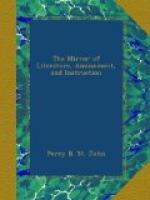[4] “This chapel,” says Hasted, “stands
remarkably in three parishes—the
pulpit in Speldhurst, the
altar in Tunbridge, and the vestry in Frant.
The stream also, which parted
the counties of Kent and Sussex,
formerly ran underneath it,
but is now turned to a greater distance.”
—Hist.
Kent, vol. iii.
* * * * *
LOVE.
(For the Mirror.)
Sing ye love? ye sing it not,
It was never sung, I wot.
None can speak the power of love,
Tho’ ’tis felt by all that
move.
It is known—but not reveal’d,
’Tis a knowledge ever seal’d!
Dwells it in the tearful eye
Of congenial sympathy?
’Tis a radiance of the mind,
’Tis a feeling undefin’d,
’Tis a wonder-working spell,
’Tis a magic none can tell,
’Tis a charm unutterable.
Lear.
* * * * *
GRAYSTEIL.[1]
An historical ballad.
(For the Mirror.)
Beneath the Douglas plaid, he wore a grinding
shirt of mail;
Yet, spite of pain and weariness, press’d
on that gallant Gael:
On, on, beside his regal foe, with eyes
which more express’d
Than words, expecting favour still,
from him who once caress’d!
“’Tis,” quoth
the prince, “my poor Graysteil!” and spurr’d
his steed
amain,
Striving, ere toiling Kilspindie, the
fortalice to gain;
But Douglas, (and his wither’d heart,
with hope and dread, beat high)
Stood at proud Stirling’s castle-gate,
as soon as royalty!
Stood, on his ingrate friend to
gaze; no answ’ring love-look came;
Then, mortal grief his spirit shook, and
bow’d his war-worn frame;
Faith, innocence, avail’d
not him! he suffer’d for his line,
And fainting by the gate he sunk, but
feebly call’d for wine!




